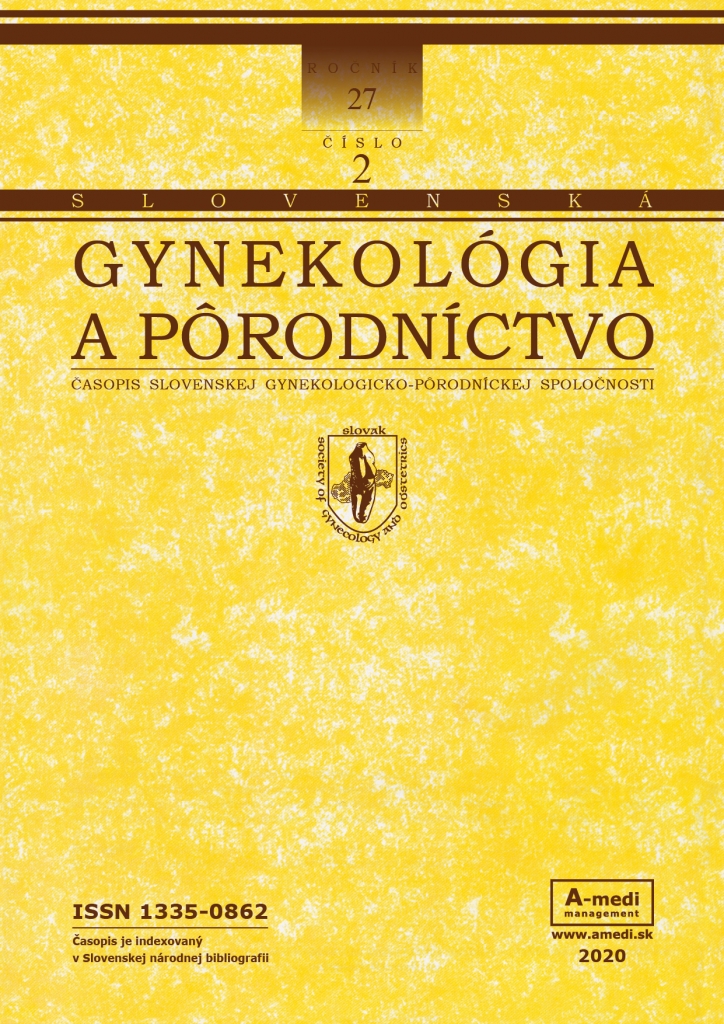
Slovak Gynecology and Obstetrics
- Článok
- Obsah 4/2017
- Archív
- Voľne dostupné články
- Redakčná rada
- Pokyny pre autorov
- Autodidaktické testy
Téma:
Intrauterine ultrasound guided procedures AT THE 2ND Depart ment of Obstetrics and Gynecology – 12-YEAR RETROSPECTIVE OVERVIEW
V. Ferianec, M. Križko, ml., M. Gábor, P. Papcun, M. Redecha, M. Dráb, M. Feriancová, I. Kunochová, M. Fojtíková, M. Borošová, K. Holomáň, I. Hollý, J. Záhumenský
An unborn foetus with abnormal development has become, thanks to the biomedical
progress which enabled prenatal screening and highly resolving imaging methods,
a real patient. The events as foetal malformation or ‘in utero’ originated problems
might be at present ‘in utero’ not only diagnosed but also treated.
Foetal therapy in some situations besides conservative medicamental treatment also
requires invasive intrauterine approach. Using intensive intrauterine treatment,
we might solve a lot of previously infaust situations - previable rupture of membranes,
foetal hydropses (either related or not with foetal anaemia), need for hormonal
treatment of a foetus. The idea of foetal therapy is to prevent irreversible impairment
of organs and intrauterine or early postnatal death. Foetal interventions present
a broad spectrum of procedures on foeti while they are linked with placental
circulation. However, an expected benefit for the foetus and its mother has to overcome
risk related to it.
This work aims to present a 12-year retrospective overview of intrauterine procedures
of foetal diagnosis and therapy performed at the 2nd Department of Obstetrics
and Gynecology, University Hospital Bratislava.
Ročník 2017 Témy časopisu Slovak Gynecology and Obstetrics 4 / 2017
Original works
Case study
doc. MUDr. Martin Redecha, PhD.
EDITORIAL BOARD
prof. MUDr. Miroslav Borovský, CSc.
prof. MUDr. Ján Danko, CSc.
prof. MUDr. Karol Holomáň, CSc.
MUDr. Ľudovít Janek
prof. MUDr. Štefan Lukačín, PhD.
prof. MUDr. Miloš Mlynček, CSc.
prof. MUDr. Ján Štencl, CSc.
doc. MUDr. Ivan Hollý, CSc.
doc. MUDr. Miroslav Korbeľ, CSc.
doc. MUDr. Jozef Višňovský, PhD.
doc. MUDr. Pavol Žúbor, DrSc.
doc. MUDr. Igor Rusňák, PhD.
MUDr. Jozef Adam
MUDr. Tibor Bielik, PhD.
PUBLISHER
Slovenská gynekologicko-pôrodnícka spoločnosť
Adresa: Antolská 11, 851 07 Bratislava
IČO 31802800, DIČ 2021515243
telefón-fax: 02/68 67 2 725
e-mail: slovenskagynekologia@gmail.com
EDITORIAL OFFICE OF JOURNAL
A-medi management, s. r. o.
Kupeckého 3,821 08 Bratislava
IČO: 44057717
telefón-fax: 02/55 64 72 47
e-mail: amedi@amedi.sk, www.amedi.sk
EDITOR-IN-CHIEF
Ing. Danica Paulenová
e-mail: paulenova@amedi.sk
GRAPHIC LAYOUT AND TYPESETTING
Lucia Vecseiová
e-mail: dtp@amedi.sk
MARKETING MANAGER
Ing. Dana Lakotová
mobil: 0903 224 625
e-mail: marketing@amedi.sk
LANGUAGE PROOFREADING
Mgr. Eva Doktorová
PROOFREADING OF ENGLISH TEXTS
Mgr. Jana Bábelová
ECONOMY AND SUBSCRIPTIONS
Ing. Mária Štecková
telefón: 02/55 64 72 48
mobil: 0911 117 949
e-mail: ekonom@amedi.sk

